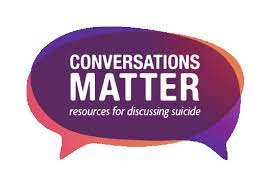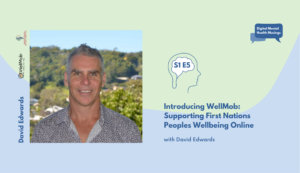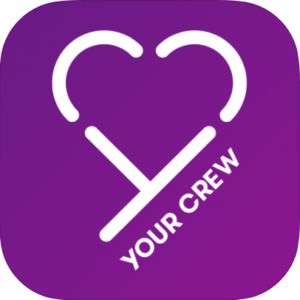Sign up below to receive monthly eMHPrac newsletters and updates about the latest digital mental health news, events, and resources.

Welcome to the September 2021 edition of the eMHPrac newsletter. This month, we observed R U OK? Day and World Suicide Prevention Day, raising awareness about suicide and the importance of taking active steps to support the mental health of those around us. With one in five Australians experiencing mental illness every year, and one in eight considering suicide at some point in their lives, starting a conversation about mental health can be a vital step in assisting someone towards recovery.
This edition features some key digital resources to assist consumers in having difficult conversations with someone they are concerned about, whilst looking after their own mental health. The featured service, the YourCrew app, connects users to supports that they know and trust when they are struggling.
This month we also acknowledged Women’s Health Week, which served as a reminder to empower Australian women in seeking healthier choices. In this edition, we highlight some key digital mental health resources for women.
This edition also features the newly updated eMHPrac Guide to Digital Mental Health Resources and some of the changes you can expect to see in the latest edition.
In this edition
- Facilitating difficult conversations
- Digital mental health services for women
- eMHPrac Guide to Digital Mental Health Resources Updated!
- Latest eMHPrac Podcast – Episode 5 with David Edwards
- Upcoming Live Webinar
- See the eMHPrac team at these upcoming conferences
- Read the latest dMH research articles
- This month’s featured service: AIMhi Stay Strong
Facilitating difficult conversations
In light of R U OK? Day and World Suicide Prevention Day, it is important to acknowledge consumers who might be worried about someone close to them. Many consumers engaged in mental health treatment are also supporting someone with a mental health problem or seek treatment to learn how to assist a loved one.
In the process of supporting others, consumers are often faced with having difficult conversations (including conversations about suicide), query how to best provide practical or emotional support to others, or how to assist someone in accessing or navigating professional mental health treatment. Featured below are three digital resources supporting consumers in having difficult conversations with someone they are concerned about.
For more information, eMHPrac’s new Digital Mental Health for Carers Factsheet lists digital services to assist consumers in supporting others, whilst looking after themselves. This resource has been developed to help health practitioners select suitable digital mental health resources for clients or to hand out to clients for self-help.
View or download the Digital Mental Health for Carers Factsheet here: https://bit.ly/3l8Zq2G
The Check-in app – Youth Beyond Blue
The check-in app helps young people check in with friends and family who might be struggling. The app coaches users through how they might support their friends, helping to take the fear out of having a conversation and providing advice on the next steps.

Conversations Matter
Conversations Matter connects professionals and community members with online tools supporting the safe discussion of suicide. The website includes practical resources on how to talk about suicide, talking to someone you are worried about, finding support, and more.

You Are Not Alone – SANE Australia
Information and tools to assist carers throughout the stages of supporting someone who has attempted suicide, or who is at risk.
Digital mental health services for Women

In September we celebrated Women’s Health Week (6-12 September), and we take a look at some of the digital mental health services designed to support women’s mental health and wellbeing.
In Australia, we are fortunate to have a range of digital mental health services and resources available that have been designed with women’s issues and needs in mind. We have listed some suitable resources below and for more information head to our eMH Directory or read our article on digital mental health resources for women.
- Beyond Blue (1300 22 4636)
- Information on how anxiety and depression affect women, the factors that affect them, the signs and symptoms, and how to find support.
- Phone, email, and online chat counselling.
- Headspace
- Information and peer support through online group chats for young women on a range of topics including supporting others, relationships, violence at home, and coping with mental health issues.
- 1800Respect (1800 737 732)
- Online and telephone counseling service for people experiencing violence in their relationships.
- Information on healthy relationships, violence, abuse, and supporting someone else.
- Daisy App
- Information and support for Australian women experiencing violence or abuse. Available on Apple and Android devices, connects users to local services, and includes safety features to maintain privacy.
- Sunny App
- For women with disabilities who have experienced violence and abuse. Available on Apple and Android devices, supporting women to tell their story, understand what happened, know their rights and find support.
- Guiding Light (1300 308 307)
- Phone and online counselling for parents and families following the loss of a child.
- Information, support, and articles on bereavement and the death of a young child for women.
- MumSpace
- Information and resources for pregnant women, new mums and their families.
- Includes online treatment programs MumMoodBooster and Mum2BMoodBooster and the MindMum app.
- PANDA
- Information and support for women experiencing perinatal anxiety and depression, as well as their partners and carers during pregnancy and the first year of parenthood.
- Parents Beyond Breakup: Mum’s in Distress (1300 853 437)
- Support group for mums experiencing trauma relating to family breakdown and separation.
- This Way Up: MUMentum Pregnancy and Postnatal Course
- Online CBT courses for women experiencing perinatal anxiety or depression, providing skills and support to take care of their mental health.
eMHPrac Guide to Digital Mental Health Resources Updated!
The latest version of the eMHPrac Guide to Digital Mental Health Resources is now available!
The eMHPrac Guide to Digital Mental Health Resources provides an overview of various Australian online programs, apps, crisis helplines, and information sites. All the services listed in this guide have been developed by credible sources, and the majority are free or low-cost. For ease of use, the Guide is separated into 5 sections; crisis services, services by diagnosis, services by specialist target group, services by delivery mode, and the newly introduced; resource by organisation.
View or download the September 2021 edition of the eMHPrac Guide to Mental Health Resources here: https://bit.ly/3lsXP83
Did you catch the latest episode of the eMHPrac Podcast?
Ep.5 – Introducing WellMob: Supporting First Nations Peoples Wellbeing Online

In episode 5, Dr. Ruth Crowther speaks to David Edwards about the WellMob website, the role of digital mental health in supporting the health and wellbeing of First Nations people, and his journey to working in digital mental health.
David Edwards is a Worimi man who grew up in Turrbal/Jagera country and now lived in the Bundjalung lands of northern NSW. David works under the national e-Mental Health in Practice from University of Sydney’s University for Rural Health in Lismore NSW as the co-director of the WellMob website program that provides a digital library of Aboriginal and Torres Strait specific wellbeing resources. David also works as Manager Resource Development for a national First Nations fathering program under the SMS4dads for the University of Newcastle. David also runs the ‘Eco-Connections’ consultancy business delivering ecological and cultural heritage services for community, NGOs and government allies that are culturally responsive to First Nations community needs and aspirations in looking after country, health, and wellbeing.
Ruth and David discuss the WellMob website, how it came into being, why it was created, the types of resources included on the WellMob site, and how health practitioners, community workers, and consumers can utilise the site. David and Ruth also discuss the role of digital mental health resources in mental health care for First Nations Australians and how they hope to see this role evolve into the future.
You can also access Digital Mental Health Musings on Soundcloud, Apple Podcasts, Spotify, Google Podcasts, Amazon Music, and Deezer.
Upcoming Black Dog Institute Live Webinar
Webinar 50 | Smoking Cessation and Mental Health: Quit Using the Word ‘Quit’
Yue 12th October 1:00pm (Austalia/Sydney)
Tue 12th October 8:00pm 9Australia/Sydney)
This webinar will present evidence-based strategies to engage and motivate smokers with mental health issues to cease smoking. It will cover the prevalence, theory, and practice of nicotine addiction and its management. Key concepts will be introduced, as well as current best practice in pharmacotherapies and behavioural interventions. A cast study will be presented for discussion.
Learning objectives:
- Describe the behaviour of nicotine addiction and withdrawals
- Describe and debunk myths regarding smoking cessation treatment
- Assess and devise an individual smoking cessation plan
- Identify e-mental health smoking cessation resources and application
Presented by: Dr Phoebe Holdenson-Kimura
Phoebe is a GP working in Sydney who is passionate about promoting mental wellbeing and supporting GPs who have a special interest in Mental Health. With recent experience working in rural Far North Queensland and Combodia, she is interested in rural and global perspectives on mental health.

Catch us at these upcoming conferences

Digital Mental Health Musings Live
7 October 2021, Online
A live special episode of the Digtial Mental Health Musings Podcast where Dr Ruth Crowther, Heidi Sturk, and Ingrid Ozols will discuss the benefits of digital mental health resources in supporting mental health and wellbeing during such challenging times.
Tune in and participate in the conversation on the eMHPrac facebook page!
Ngar-wu Wanyarra Aboriginal and Torres Strait Islander Health Conference
13 October 2021, Online
The Ngar-wu Wanyarra Aboriginal and Torres Strait Islander Health Conference aims to facilitate the exchange of information on key issues in Aboriginal and Torres Strait Islander peoples’ health and wellbeing.
David Edwards and Sharnie Roberts from WellMob will be presenting on the WellMob site and how it can be used as a wellbeing tool.
To register for the conference or view the program, click the link below.
TheMHS Conference
12-15 October 2021, Online
The 31st TheMHS Conference explores the theme of ‘HOPE into Action’, sharing, embracing, reflecting, celebrating and exploring diversity, lived experience, stories, creativity, and wisdom.
Catch our director Heidi Sturk presenting on the Digital Technology panel on bridging the divide between practitioner and consumer use of digital mental health.
To register for the conference or view the program, click the link below.
Indigenous Wellbeing Conference
6-7 December 2021, Cairns
Unfortunately, due to COVID-19, this conference has bow been postponed until December 2021.
At the 2021 Indigenous Wellbeing Conference, you will discover the latest indigenous-led, grassroots programs and projects taking place around the nation and across the seas.
To register for the conference or view the program, click the link below.
International Mental Health Conference
31 January to 2 February 2022, Gold Coast
Unfortunately, due to COVID-19, this conference has now been postponed until January 2022. Keep an eye on the website for all the latest information.
On our reading radar…
Mental illness and suicide among physicians
Harvey S B, Epstein R M, Glozier N, Petrie K, Studwick J, Gayed A, Dean K, Henderson M. Mental illness and suicide among physicians. The Lancet 2021;398(10303). DOI: https://doi.org/10.1016/S0140-6737(21)01596-8
“The COVID-19 pandemic has heightened interest in how physician mental health can be protected and optimised, but uncertainty and misinformation remain about some key issues. In this Review, we discuss the current literature, which shows that despite what might be inferred during training, physicians are not immune to mental illness, with between a quarter and a third reporting increased symptoms of mental ill health. Physicians, particularly female physicians, are at an increased risk of suicide. An emerging consensus exists that some aspects of physician training, working conditions, and organisational support are unacceptable. Changes in medical training and health systems, and the additional strain of working through a pandemic, might have amplified these problems. A new evidence-informed framework for how individual and organisational interventions can be used in an integrated manner in medical schools, in health-care settings, and by professional colleagues is proposed. New initiatives are required at each of these levels, with an urgent need for organisational-level interventions, to better protect the mental health and wellbeing of physicians.”
Mental Health Service User and Worker Experiences of Psychosocial Support Via Telehealth Through the COVID-19 Pandemic: Qualitative Study
Venville A, O’Connor S, Roeschlein H, Ennals P, McLoughlan G, Thomas N. Mental Health Service User and Worker Experiences of Psychosocial Support Via Telehealth Through the COVID-19 Pandemic: Qualitative Study. JMIR Ment Health 2021;8(8):e29671. URL: https://mental.jmir.org/2021/8/e29671. DOI: 10.2196/29671
“During the COVID-19 pandemic, we saw telehealth rapidly become the primary way to receive mental health care. International research has validated many of the benefits and challenges of telehealth known beforehand for specific population groups. However, if telehealth is to assume prominence in future mental health service delivery, greater understanding of its capacity to be used to provide psychosocial support to people with complex and enduring mental health conditions is needed.
…We focused on an Australian community-managed provider of psychosocial intervention and support. We aimed to understand service user and worker experiences of psychosocial support via telehealth throughout the COVID-19 pandemic.
…This study was jointly developed and conducted by people with lived experience of mental ill health or distress, mental health service providers, and university-based researchers. Semistructured interviews were conducted between August and November 2020 and explored participant experiences of receiving or providing psychosocial support via telehealth, including telephone, text, and videoconferencing. Qualitative data were analyzed thematically; quantitative data were collated and analyzed using descriptive statistics.
…Service users (n=20) and workers (n=8) completed individual interviews via telephone or videoconferencing platform. Service users received psychosocial support services by telephone (12/20, 60%), by videoconferencing (6/20, 30%), and by both telephone and videoconferencing (2/20, 10%). Of note, 55% (11/20) of service user participants stated a future preference for in-person psychosocial support services, 30% (6/20) preferred to receive a mixture of in-person and telehealth, and 15% (3/20) elected telehealth only. Two meta-themes emerged as integral to worker and service user experience of telehealth during the pandemic: (1) creating safety and comfort and (2) a whole new way of working. The first meta-theme comprises subthemes relating to a sense of safety and comfort while using telehealth; including trusting in the relationship and having and exercising choice and control. The second meta-theme contains subthemes reflecting key challenges and opportunities associated with the shift from in-person psychosocial support to telehealth.
Overall, our findings highlighted that most service users experienced telehealth positively, but this was dependent on them continuing to get the support they needed in a way that was safe and comfortable. While access difficulties of a subgroup of service users should not be ignored, most service users and workers were able to adapt to telehealth by focusing on maintaining the relationship and using choice and flexibility to maintain service delivery. Although most research participants expressed a preference for a return to in-person psychosocial support or hybrid in-person and telehealth models, there was a general recognition that intentional use of telehealth could contribute to flexible and responsive service delivery. Challenges to telehealth provision of psychosocial support identified in this study are yet to be fully understood.”
This edition’s featured service…

YourCrew
An app that allows young people to ask for help when they need it most, from people they know and trust.
About YourCrew
YourCrew is a mood tracking app developed by Harrison Riedel Foundation connecting users with people they know and trust when they are struggling. The app allows users to invite friends to join their ‘Crew’, who take an oath to help confidentially and without judgement. Users can track their moods on a calendar using emojis or a quick written log, create and share a safety plan, write in a private journal, access information, pathways to help and emergency support within the app. If the user is consistently recording low mood, their Crew is alerted to reach out and see how they can help.
Who is YourCrew for?
The app is designed to support young people aged over 12 years struggling with low mood.
Is there a cost to use YourCrew?
No – YourCrew is free to download on smartphone and tablet devices.
How to access YourCrew
YourCrew can be downloaded from the iTunes App Store (IOS) or on Google Play (Android).







